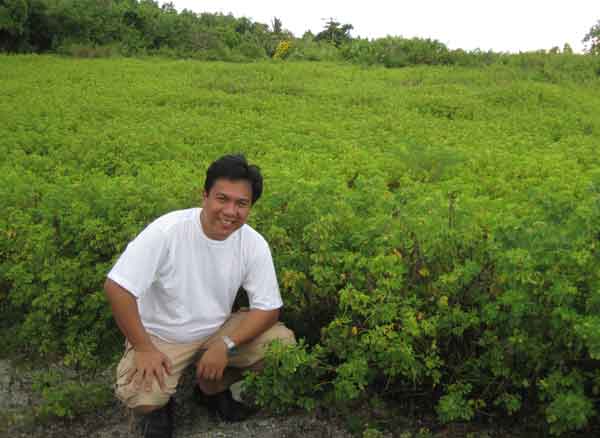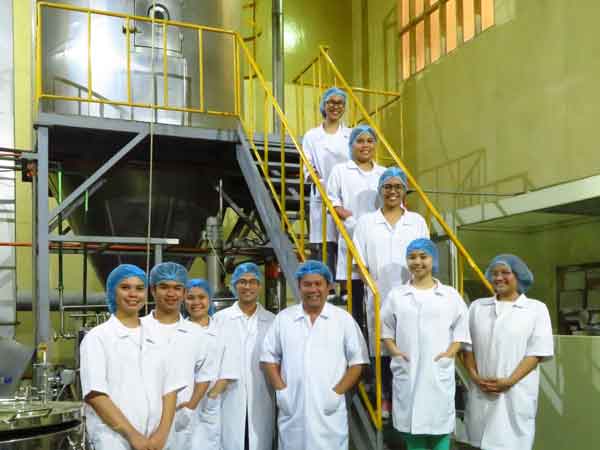Planting health
Manila Times
By
Leah C. Salterio
March 27, 2020

President, Herbanext Laboratories
Local herbal extracts reach the next level under this scientist’s commitment
Aquaculture was far from any course that Philip S. Cruz considered during his university days. But after encountering fishpond operators during a one-day conference, he was hooked.
He worked on his new obsession, building automatic fish feeders and typhoon-resistant sea cages, and developed the now-popular mariculture park technology, among other innovations. However, the industry landscape changed in the late 1990s.
“I saw Philippine aquaculture was rapidly losing competitiveness globally,” Cruz recalls. “So, in 2001, I decided to diversify my business and research interest into herbal products and established Herbanext Laboratories.”

COMMITTED TO LIFE (Top) Cruz in his award-winning natural laboratory in Bago, Negros Occidental; and with his accomplished staff who are responsible for the company’s impressive growth in the last two decades. CONTRIBUTED PHOTOS
Hobby to profession
Prior to pursuing aquaculture in the University of the Philippines (UP) Diliman, Cruz was an agriculture major at UP Los Baños. He was familiar with growing herbal plants, naming his new venture Herbanext Laboratories, whose goal was to bring Philippine medicinal herbs to the next level. For his efforts to promote spray-dried herbal extracts, he was named one of The Outstanding Young Men of the Philippines in 2005.
“My entry to herbal products was through a [medicinal] mushroom known as Ganoderma lucidum, which has over a thousand-year history of use in the Orient,” Cruz narrates. “At first, growing the mushroom was just a hobby. I took it as a food supplement for myself to help address my high cholesterol and gout. The supplement worked very well and allowed me to drop by anti-cholesterol and anti-gout drugs.”
Eventually, Cruz and his wife Ruby decided to make a business out of his hobby. Since he knew very little about medicinal plants, he started attending international conferences. “A particular session that opened my eyes was the 5th International Medicinal Mushroom Conference in Shanghai, China in 2009. There, I met a lot of scientists and medical doctors from all over the world who were studying the medicinal applications of different species of medicinal mushrooms.
When Herbanext Laboratories was established, it started as a small business enterprise. Subsequently, it underwent major transformation in 2006. With the help of the Department of Science and Technology (DoST), the company expanded even further in the years that followed. As it enters into its two-decade run next year, Cruz cannot be any prouder with the success of Herbanext Laboratories.
“When we established Herbanext in 2001, we had one thing clear in our mind — we wanted to develop a science-based herbal company that made use of standardized extracts of Filipino medicinal plants,” Cruz maintains. “We knew all along that we wanted to do was not going to be easy, because nobody has done it before, and we had to start from scratch. What we learned early on was that to succeed quickly in this arena, we would have to invest heavily in a sustained marketing campaign.”
However, Cruz decided instead to plow his funds into research and development and invested in modernizing the company’s equipment and facilities. Thus, Cruz describes the first five years of Herbanext as merely just a “backyard operation” in a 400-square meter area. The succeeding years saw the plant steadily growing.
“In 2011, we saw a 1,200-square-meter plant,” Cruz beams. “On our 20th year next year, as we expand our toll manufacturing operations, I expect to have a plant area of at least 3,600 square meters for the manufacture of herbal extracts, herbal drugs, food supplements and cosmetic products.”
Growing supply chain
Cruz is openly grateful for the help extended by the DoST to Herbanext Laboratories to raise its game and upgrade the company’s manufacturing plant more than 10 years ago. Herbanext availed of an interest-free loan from DoST Region 6 through the Small Enterprise Technology Upgrading Program (DoST-Setup) in 2007 and again in 2012,” Cruz discloses. “Both loans were used to acquire modern manufacturing equipment for processing medicinal herbs.
For the past 19 years, Herbanext, which operates from its base in Bago City, Negros Occidental since its inception in 2001, has been successful in developing a supply chain for raw materials that befitted small farmers and marginalized communities. That is particularly important in Negros Island, which relies heavily on sugar cane, a crop that is viable only in large-scale farming operations,” Cruz says. “That turned out easier than done, because it is not really possible to create any significant socio-economic impact to the supply chain, unless we are able to buy large quantities of raw materials.”
To create such large demand of raw materials, Cruz acknowledges that his company needs to bring herbal products to the level of drugs, so hospitals and doctors will endorse their products. “I estimate that for every million Filipinos that take herbal drugs, instead of synthetic drugs, as much as 10,000 full-time jobs for farmers can be created.” He specifically cites the Tuklas Lunas program of the DOST, which started in 2012. “Things are starting to take shape and an unprecedented number of herbal drugs will be released in the market in the coming years,” Cruz informs. “At present, we are providing employment to around 30 small farmers and 20 Ati (indigenous people) families in Negros Occidental. They supply us with various medicinal herbs, including turmeric, ginger, ampalaya, sinampalukan and tawa-tawa.
Herbanext Laboratories boasts of around 50 employees in its Negros Occidental plant. Half of the number are technical people. Cruz sees the company expanding its operations in the next three to five years in Davao. “There is so much variety of medicinal plants from all over Mindanao [in Davao],” he says, also expressing his desire to eventually venture in Manila. “One of these days, perhaps for a joint venture in the extraction of medicinal marijuana (cannabidol), as our current facility is already capable of processing that.”
Previously, Cruz was hands-on in practically all aspects of plant operations in Herbanext Laboratories, simply because the company was at its the first few years of development. “A big weight off my shoulder is the R&D Department, now headed by my second son, Aidan, who has a molecular biology background,” Cruz proudly says. “I remain actively involved, however, solving problems related to the operation of our extraction equipment, as most of these are imported and specialized with no local service technicians. I have learned a good deal of trouble-shooting since my aquaculture days.”
His most important learning curve was learning to do business while keeping his core value as a scientist. “Quality has been my guiding principle ever since and I believe that has been the reason Herbanext is where it is now,” he says. His toughest challenge as president of Herbanext Laboratories? “Getting the next generation interested in the business,” Cruz muses. “Thankfully, I am past that challenge already with my two boys looking forward to taking Herbanext to new horizons once they are done with their graduate studies.”
Cruz credits his businesswoman-wife, who constantly supports and appreciates his work. “She has tirelessly guided me in my journey from being a scientist to a businessman” The couple is blessed with three boys — Theon, the chemist, Aidan, the molecular biologist and David, the budding entrepreneur who takes after his mom. Cruz is the son of Teodoro Cruz from the Ferrer clan of Pangapisan, Lingayen in Pangasinan and Salud Sanchez from Sanchez clan of Tugatog, Malabon. Both his parents were professors at the University of the Philippines Diliman.
His mother, a chemist, always wanted him to follow in her footsteps. “I would have if I only made the cut in UP Diliman,” Cruz humbly asserts. “But that was not meant to be, so I ended up taking agriculture in UP Los Baños, following my dad. During my second year in UP Los Baños, in the process of shifting to zoology as a pre-med course, he acquired a fishpond and asked me to attend a fishpond operators conference in Manila on his behalf.” That, as they say, was history — and a novel pathway to future health options for Filipinos.
